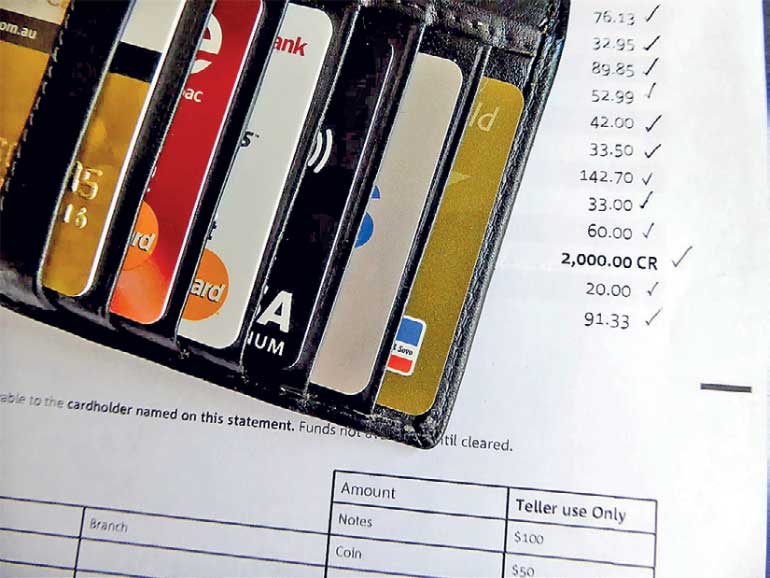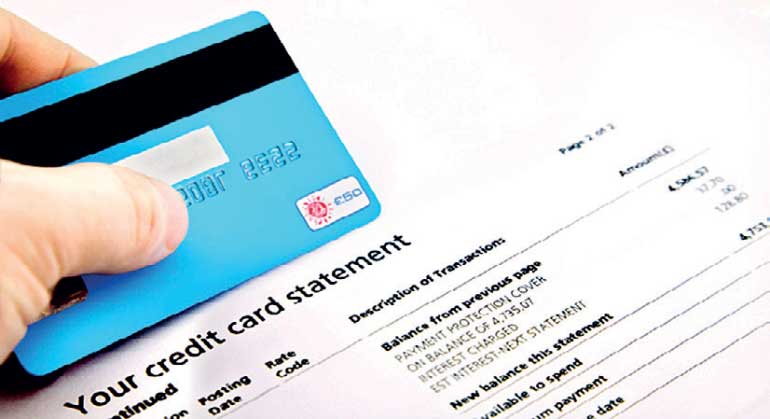Wednesday Feb 25, 2026
Wednesday Feb 25, 2026
Tuesday, 31 August 2021 01:22 - - {{hitsCtrl.values.hits}}

Surcharge on DCC payments
By Mario Ratnaraja
Sri Lanka’s leading commercial banks recently announced a notable hike on credit and debit card charges on overseas transactions, causing panic amongst some sectors and individuals, some of whom took to social media to discuss the matter.
The move means that the rate of exchange at the time of billing for Visa and MasterCard increased from 2.5% to 7% on overseas transactions on credit/debit cards with effect from 25 August. As such, users now have to pay a processing fee (billed in LKR) of 5% on their transactions, including Dynamic Currency Conversion (DCC) transactions to Merchants located overseas or 'operates' online. Banks revealed that the hike reflects the current exchange rate movements. What exactly does this mean? Who would be affected by the levy? Let us delve deeper into the complexities of the matter.
Why did banks increase the exchange rate levy on foreign transactions?
Bank spokespersons revealed that the main trigger behind is the actual foreign exchange rate in the market, which differs from what the Central Bank has published. While most banks currently use rates used by Mastercard and Visa, which are the rates published by the Central Bank and other institutions such as Reuters, the market operates at a more depreciated value. Hence, the banks incur a lot more as they are unable to obtain specific foreign currency from their treasuries at the same rate at which those transactions are going through. This out of the norm status quo is a direct result of the prevailing volatile economic environment, and more specifically, the fact that the country’s foreign reserves is not at the optimum level.
Sri Lanka’s gross official reserves declined to $ 2.8 billion by end July 2021. Even though there was a boost to reserves from the $ 780 million SDR (Special Drawing Rights) allocation, reserve coverage is extremely limited to the extent that external liabilities will spread out in the months and years ahead.
The only viable option for banks to compensate for the higher exchange rate compared to the published rate is to increase the DCC rate. Hence, the additional 5% levy on foreign transactions, which limits the outflow on foreign exchange to compensate for the mismatch between inflows and outflows.
In layman’s terms, this means that credit and debit card users will have to pay more for products and services they obtain from and through overseas or online-based companies. For instance, if someone uses their credit or debit card to pay for Uber transactions such as rides and food delivery, they are going to incur an additional cost to the actual price of the service.
What are the reasons behind decline in gross official reserves?
In addition to the obvious lack of tourism inflows and recent decrease in remittances, the flow of cash from within the country to overseas vendors through unregistered companies operating in Sri Lanka adds to the burden on official reserves. With the COVID-19 pandemic and its economic and global mobility challenges prevailing, the country’s return to earnings from the tourism sector and certain export segments will be slow to recover.
What can the Government do to stop the outflow of USD from Sri Lanka?
However, there is a glimmer of hope regarding the easing of the gross reserve crisis. This is by getting unregistered foreign organisations to register in Sri Lanka to prevent the outflow of USD. At present, the annual outflow of USD through unregistered companies remains at about $ 600 million.
The Government stepped into stem the outflow of USD with the introduction of a 2.5% stamp duty tax on services bought through credit cards in 2019. As the Government authorities explained, the tax increase compensated for the USD cash flow out of the country through digital companies such as Uber.
In justifying the tax, the Government said that while local companies such as PickMe and Takas paid domestic income tax, foreign digital companies did not, as their revenues were booked in tax havens like in the Netherlands and Ireland.
In this context, inviting such companies to register in Sri Lanka would curtail the outflow of USD from the country, and hence ease the burden on foreign reserves.
The writer is a Creative Director/Copywriter with over 35 years’ experience. He is a BA Econ graduate with an MSc in Strategic Marketing. He is focused on digital marketing, applications of emerging tech such as AI, IoT and machine learning. He can be contacted via [email protected]
